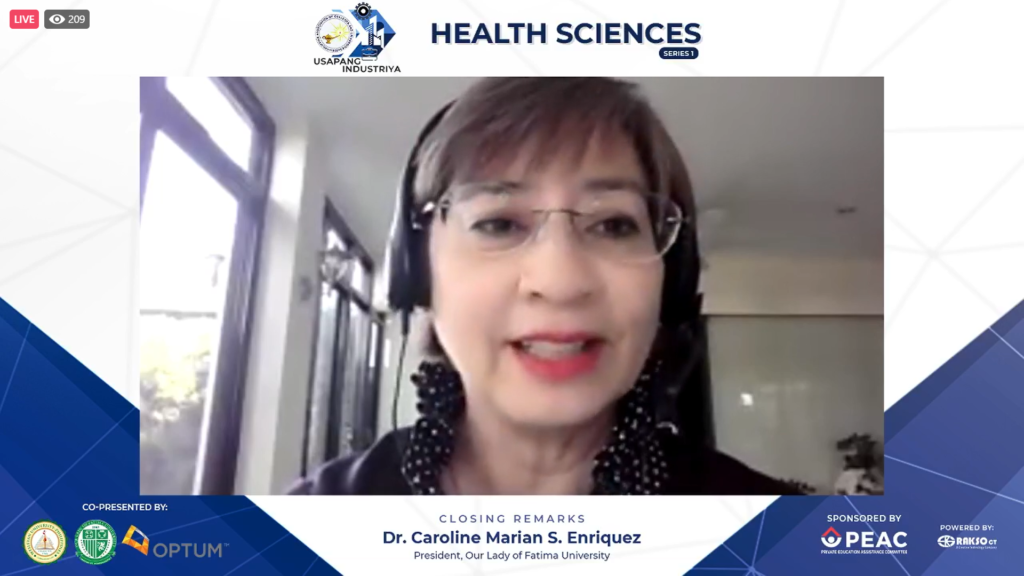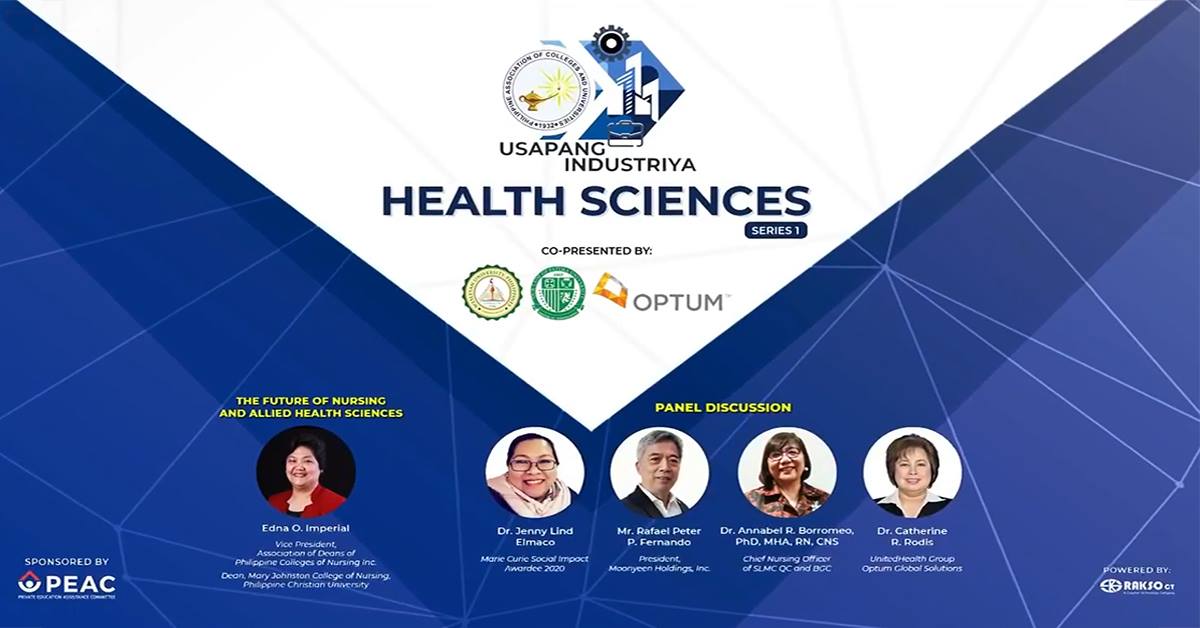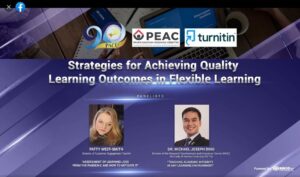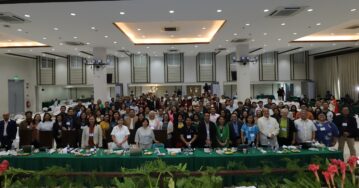Last 30 April 2021, the Philippine Association of Colleges and Universities (PACU) held the very first episode of its Usapang Industriya series: Health Sciences, broadcasted live on its official Facebook page.
Our Lady of Fatima University (OLFU) was a co-presenter of this event, together with Wesleyan University Philippines and health services innovation company Optum.
In his welcome remarks, PACU Trustee and Chair of its Industry Academe Committee, and President of the University of Iloilo-PHINMA Education, Dr. Raymundo Reyes shared that Usapang Industriya was formed with the goal of “bringing industry and academe together, mainly for the purpose of improving the employability of our graduates.” Other industries shall also be tackled in future talks of the series.
Judge Benjamin D. Turgano (ret.), President of Wesleyan University-Philippines, likewise delivered his opening greetings with words of encouragement for the academic community. “It is in this context that we need to look inward to our institutions to rationalize our programs but at the same time, we need to look outward to the needs and realities on the ground. Indeed, it is time to look into the gaps and do something about it,” he said.
Dean Edna O. Imperial of the Mary Johnston College of Nursing, Philippine Christian University (PCU) was the resource speaker for the lecture portion entitled, “The Future of Nursing and Allied Health Sciences”. In her talk, she discussed current data and forecasts on the demand for nurses and healthcare workers around the globe, as well as the future of education. She also tackled the “Urgent Health Challenges for the Next Decade”, identified by the World Health Organization Director, Dr. Tedros Adhanom Ghebreyesus, and discussed them in the perspective of educators in healthcare.
Dean Imperial likewise cited soft skills that must be taught to students in the allied health sciences, such as “communication” and “leadership.” “My dear colleagues in the health professions: when we teach our young health professionals, please bear in mind that we are educating the future heroes of our land, of our world,” she averred.
Nurse Charito Romano, an alumna of Wesleyan University-Philippines and a British Empire Medal awardee, gave an inspiring message where she shared her experiences working as a frontliner in the COVID-19 pandemic. She likewise expressed appreciation to the organizers of Usapang Industriya for their initiative “to update our learning journey”, that students are being prepared for the demands of the real world.
“Although there seems like there is no progress being made, we are slowly beating this pandemic; there is hope. And, one good thing that has come out in the past year is that the whole world has been reminded how important the healthcare system is—our knowledge, our expertise, and the kindness we make, make such a difference in the health and wellbeing of everyone. We have helped to keep the public safe, we have coped with intense pressure, and all of us had been extraordinary,” Nurse Romano expressed. She also encouraged everyone to get vaccinated once the opportunity becomes available.
A panel discussion followed soon after, moderated by the Dean of the OLFU College of Nursing, Dr. Maria Luisa Uayan. Panelists consisted of industry experts, namely: Dr Jenny Lind Elmaco, Regional Coordinator at EURAXESS and 2020 Marie Curie Social Impact Awardee; Rafael Peter P. Fernando, President of Moonyeen Holdings, Inc.; Dr. Annabelle R. Borromeo, Former Chief Nursing Officer of St. Luke’s Medical Center; and Dr. Catherine Rodis, Associate Director for Executive Health Resources at Optum-Global Advantage.
The panelists had an insightful exchange of thoughts and ideas about their respective industries, technological developments in healthcare, the skills and competencies that health sciences students need to develop, and the importance of academe-industry partnership in educating future health professionals.
“I think that we need to look at health and we look at science and make sure that we bridge the gap between that and the industry, business. I think we also have to do a rethink about how we look at business. Business has a very, very important role to play when it comes to addressing societal problems in the same way as science and health. I think when it comes also to education, we also have to do a big rethink: how we teach, how we guide our students at the same time, how we create an enabling environment so that at the end of the day, whether or not they want to go abroad or they want to stay here, they have this choice and this choice is clear to them,” Dr. Elmaco said as a closing message to the viewers.
Citing a quote from Albert Einstein, “We cannot solve our problems with the same thinking we used when we created them,” Dr. Borromeo said, “If we want to solve problems, I enjoin the academe and the industry to think not at the same level of thinking but really get up, move a step higher. Let us hold more of these very deep conversations about how to bridge gaps and solve problems that affect Filipinos and then the world.”
To formally conclude the first Usapang Industriya, OLFU President, Dr. Caroline Marian S. Enriquez gave her closing remarks. “Truly, this has been a very informative and enlightening session that is laden with practical advice in trends and the highs and lows for the nursing profession. Upon reflection, we realized that the strengths of collaboration, having shared and common goals, could bring into fruition successful outcomes,” she said.

She also acknowledged the difficulties brought by the pandemic upon healthcare education, but heartened the educators: “We cannot just be submissive to our situation because the healthcare profession demands that we must be agile and we must reinvent ourselves to provide that higher level of nursing and medical care. We need to leverage the use of technology to help us in this paradigm shift.”
To close, Dr. Enriquez likewise expressed her deepest appreciation and gratitude to the frontliners who have been working tirelessly and selflessly in the midst of a health crisis.



